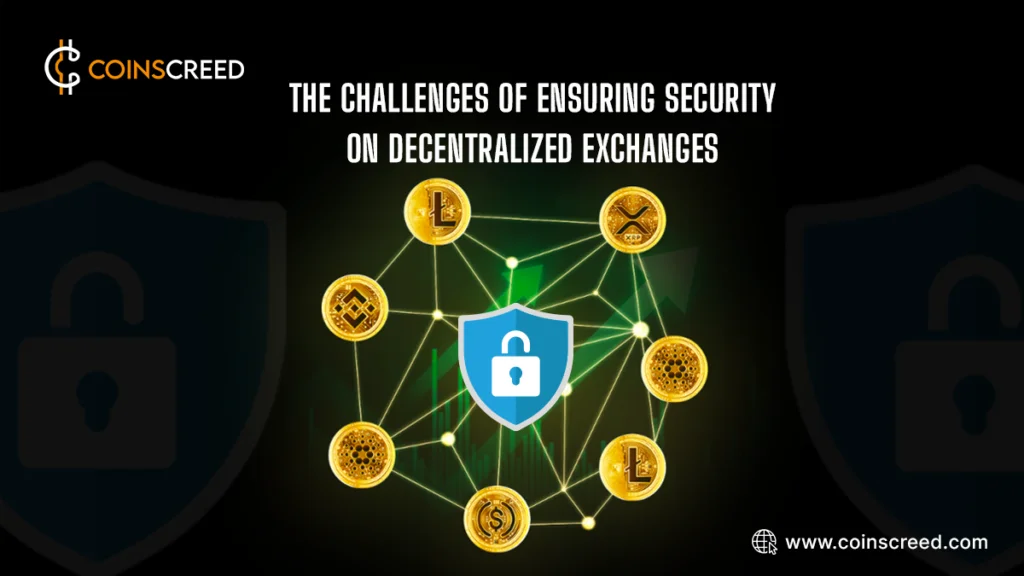Decentralized exchanges (DEXs) are a cornerstone of the DeFi ecosystem. DEXs offer users control over their assets but are not without challenges. This article will explore the challenges of ensuring security on decentralized exchanges.

What is a Decentralized Exchange?
Decentralized exchanges, or DEXs, are peer-to-peer marketplaces where cryptocurrency traders make transactions directly without handing over management of their funds to an intermediary or custodian.
These transactions are facilitated through self-executing agreements written in code called smart contracts.
DEXs remove the requirement for any authority to oversee and authorize trades performed within a specific exchange.
Decentralized exchanges allow for peer-to-peer (P2P) trading of cryptocurrencies. Peer-to-peer refers to a marketplace that links buyers and sellers of cryptocurrencies.
Characteristics of Decentralized Exchanges
Some notable characteristics of decentralized exchanges are:
- Trustless Operations
- Custody of Funds
- Decentralized Order Books
- Control
- Security
Trustless Operations
Smart contracts automate transactions, reducing the need for trust between trading parties.
Custody of Funds
Unlike centralized exchanges, where users transfer their assets to the exchange’s wallets, DEX users retain control of their private keys and, by extension, their funds.
Decentralized Order Books
In DEX, trading orders are spread across the network instead of stored in a centralized database.
Control
While centralized exchanges act as custodians of user funds, DEXs empower users with direct control over their assets.
Security
Centralized exchanges present a single point of failure, making them lucrative targets for hackers. DEXs, being decentralized, have a low vulnerability. However, they face their unique security challenges.
What are the Challenges of Ensuring Security on Decentralized Exchanges?
Despite the benefits that decentralized exchanges (DEXs) bring, there are some security concerns associated with them:
- Smart Contract Vulnerabilities
- Reentrancy Attacks
- Protocol and Implementation Risks
- Front-running
- Oracle Manipulation and Data Integrity
- Overflow/underflow
- Liquidity and Impermanent Loss Concerns
Smart Contract Vulnerabilities
One of the primary challenges in securing decentralized exchanges lies in the intricate web of smart contracts that underpin these platforms. Smart contracts, while revolutionary, are not immune to vulnerabilities. Exploitable code, bugs, and loopholes can lead to catastrophic consequences, allowing malicious actors to compromise the integrity of the exchange and manipulate transactions.
Reentrancy Attacks
These occur when, during the execution of a smart contract, an external contract is called and takes control, allowing it to call the original contract recursively.
Protocol and Implementation Risks
The intricate nature of DEX protocols can sometimes lead to unforeseen vulnerabilities. Even if the protocol is sound, improper implementation can expose the system to threats.
Front-running
Given the transparent nature of blockchain, malicious actors can view pending transactions and, by paying a higher gas fee, jump the queue to execute their transactions first.
Oracle Manipulation and Data Integrity
DEXs often rely on oracles to provide external data for smart contracts. If these oracles are compromised, they can feed inaccurate data, leading to skewed contract outcomes.
Overflow/underflow
A situation where the arithmetic operation in a smart contract exceeds the maximum or minimum limits, leading to unexpected results.
DEXs often rely on oracles to provide external data for smart contracts. If these oracles are compromised, they can feed inaccurate data, leading to skewed contract outcomes.
Liquidity and Impermanent Loss Concerns
For DEXs that rely on liquidity pools, there’s a risk known as “impermanent loss.” This happens when the price of tokens inside a liquidity pool diverges from prices outside the pool. Liquidity providers can face losses if this price divergence is significant.
How to Solve the Security Challenges of Decentralized Exchanges
There are several challenges involved in ensuring security in decentralized exchanges. In this section, we will discuss the solution to those challenges. Here are some ways to solve the security challenges of decentralized exchanges. They are:
- Smart Contract Audits
- User Education
- Enhanced Security Measures
- Real-time Monitoring
Smart Contract Audits
Regular and thorough audits of smart contracts are imperative. Security experts should review the code for any vulnerabilities, finding and fixing any possible openings before hackers exploit them.
User Education
A well-informed user is a safer user. DEX platforms must prioritize educating their users about potential risks, secure practices, and the importance of using wallets with enhanced security features.
Enhanced Security Measures
DEX platforms should continually invest in security infrastructure. Implementing advanced security measures, such as two-factor authentication and biometric verification, adds a layer of protection for users.
Real-time Monitoring
Continuous monitoring of transactions can help identify unusual patterns or suspicious activities promptly. Automated systems that trigger alerts in response to potential threats can be integral to maintaining a secure trading environment.
Conclusion
Securing decentralized exchanges in the fast-paced cryptocurrency world is an intricate dance between innovation and risk mitigation.
Overcoming challenges in smart contract vulnerabilities, regulatory uncertainty, liquidity risks, user education, cross-chain interoperability, and front-end security demands collaboration, vigilance, and a commitment to evolving best practices.
As the crypto community continues to forge ahead, addressing these challenges will be pivotal in ensuring the longevity and trustworthiness of decentralized exchanges.
